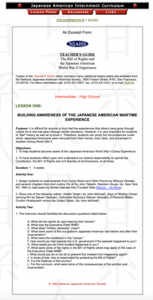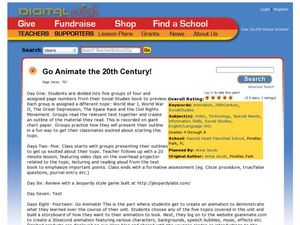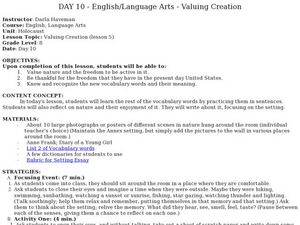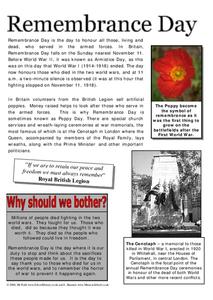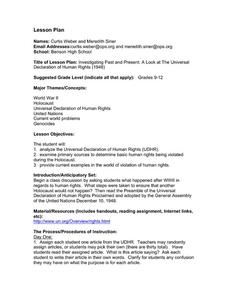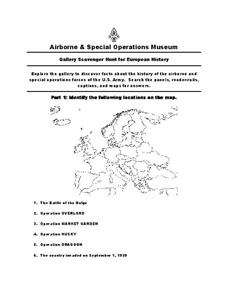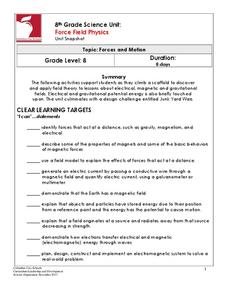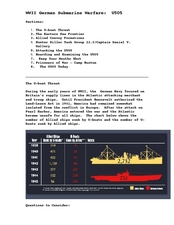Anne Frank House
Anne Frank House: The Secret Annex
A virtual tour of Amsterdam's Anne Frank House permits viewers to not only visit the Secret Annex but to also view photos and videos, examine a timeline of events, and learn about the fate of Anne Frank and her family.
Curated OER
Remembering Veterans
Students discuss the importance of remembrance and memorials. Students explore different war and memorials throughout the world. They examine the purpose of Remembrance/Memorial Day. They examine how emotions can be expressed through...
Curated OER
Building Awareness of the Japanese American Wartime Experience
Pupils research the Japanese American World War II Camp Experience. They discuss the experience in the context of civil rights and the Bill of Rights.
Curated OER
Go Animate the 20th Century!
Students create animations to match their social studies. in this 20th century lesson plan, students work in groups to read and present to their classmates World War I, World War II, The Great Depression, The Space Race, or the Civil...
Curated OER
Smithsonian Asian Pacific American Lesson: Immigration
Many of your class members will have heard of Executive Order 9066 and the Japanese internment camps of World War II. Some may even recognize the terms “Issei” and “Nisei,” but few will have heard of Enemy Alien Hearing Boards, of the...
Curated OER
Leaving Things Behind
In this World War II worksheet, 10th graders read about life in a Japanese internment camp. Students give personal response and opinions in 5 short answer questions.
Curated OER
Woodrow Wilson: Prophet of Peace
Students read and discuss various speeches by Woodrow Wilson, and write and present a brief radio address that will persuade the nation to return to world peace. Students analyze current events and discuss whether the world has upheld...
Curated OER
Ancient Greece
Pupils discover the world of ancient Greece. In this ancient Greece lesson, students compare and contrast the culture of Athens and Sparta. Pupils also compare the democracy in Athens with the democracy in the United States today.
Curated OER
Inference
Making inferences about what you read is an important skill for both elementary, middle, and high school learners. Focusing on events which occurred during World War II, they answer a series of questions related to what we can infer as...
Gilder Lehrman Institute of American History
Harriet Beecher Stowe Sends Uncle Tom’s Cabin to Victoria and Albert, 1852
Harriet Beecher Stowe's plea for abolition is not only laid plain in her acclaimed novel, Uncle Tom's Cabin, but in her written correspondence as well. High schoolers read a letter written by Stowe to Prince Albert and Queen Victoria to...
Curated OER
The Holocaust: Valuing Creation
Students write a descriptive essay. In this Holocaust lesson plan, students discuss what it must have been like for Anne Frank to stay inside for two years. Students try to appeal to all five senses in their descriptions.
Curated OER
Remembrance Day
In this social studies worksheet, learners read the information sheet that is based upon the holiday of Remembrance Day in Great Britain.
Curated OER
Investigating Past and Present: A Look at The Universal Declaration of Human Rights
Students compare the Universal Declaration of Human Rights to the war crimes of WWII. In this lesson on Human Rights, students evaluate the causes of WWII, war crimes, and determine whether the outcome might have been different otherwise.
Curated OER
Thomas Jefferson and the Declaration of Independence
Students examine readings and symbols to learn about the War of Independence and Thomas Jefferson. In this War of Independence lesson, students explore the role of Thomas Jefferson in the Declaration for Independence. Students answer...
Curated OER
European History
For this world history worksheet , 5th graders look for information related to the history of Europe. They view the facts from a map and apply them to different activities.
Curated OER
What are the components of war?
Students identify components of war. They connect relationships by developing webs. Students illustrate their comprehension of war in multimedia and produce a dialectical analysis of this illustration.
Columbus City Schools
Force Field Physics
Attracted class members to an activity-packed journey through the science behind the invisible forces at work all around us. From jump rope generators to junkyard wars, there's never a dull moment when eighth grade physics scholars...
Curated OER
Sadako and the Thousand Paper Cranes
Have your class explore the effects of war by reading Eleanor Coerr's story, "Sadako and the Thousand Paper Cranes." This is a story about a sixth grader who lives in Hiroshima when the atomic bomb is dropped. Learners answer questions,...
Curated OER
Edward R. Murrow: This Reporter
What would Edward R. Murrow think of today’s news broadcasts? Learners examine the work of the first public television newscaster and his commitment to researched, accurate reporting. The eight-day study concludes with investigators...
Curated OER
WWII German Submarine Warfare: U505
Students research how the capture of a German submarine by the Allies affected the outcome of WWII. In this WWII lesson, students complete a KWL chart. Students research primary source documents online and answer discussion questions.
Curated OER
H4 Homework Assignment #1
In this global studies worksheet, students read the noted pages in their textbooks and then respond to 4 short answer questions about World War I and Russian history.
Curated OER
Teaching About Peace Through the Cranes of Hiroshima
Students listen to the story of "Sadako and the Thousand Paper Cranes." They discuss the events of Hiroshima, effects of the bombing, and methods people can make a difference in achieving peace in the world. Students use orgami paper and...
Curated OER
Takejiro Higa - Military Intelligence Service
Eleventh graders study the contribution of Takejiro Higa in the invasion of Okinawa.
Curated OER
Teaching With Documents Lesson Plan: "A Date Which Will Live in Infamy"
Your class examines F.D.R.'s speech for examples of repetition, alliteration, emotionally charged words, etc. They listen to the speech and interview a person who heard it delivered. They finish by writing an article about the experience.




